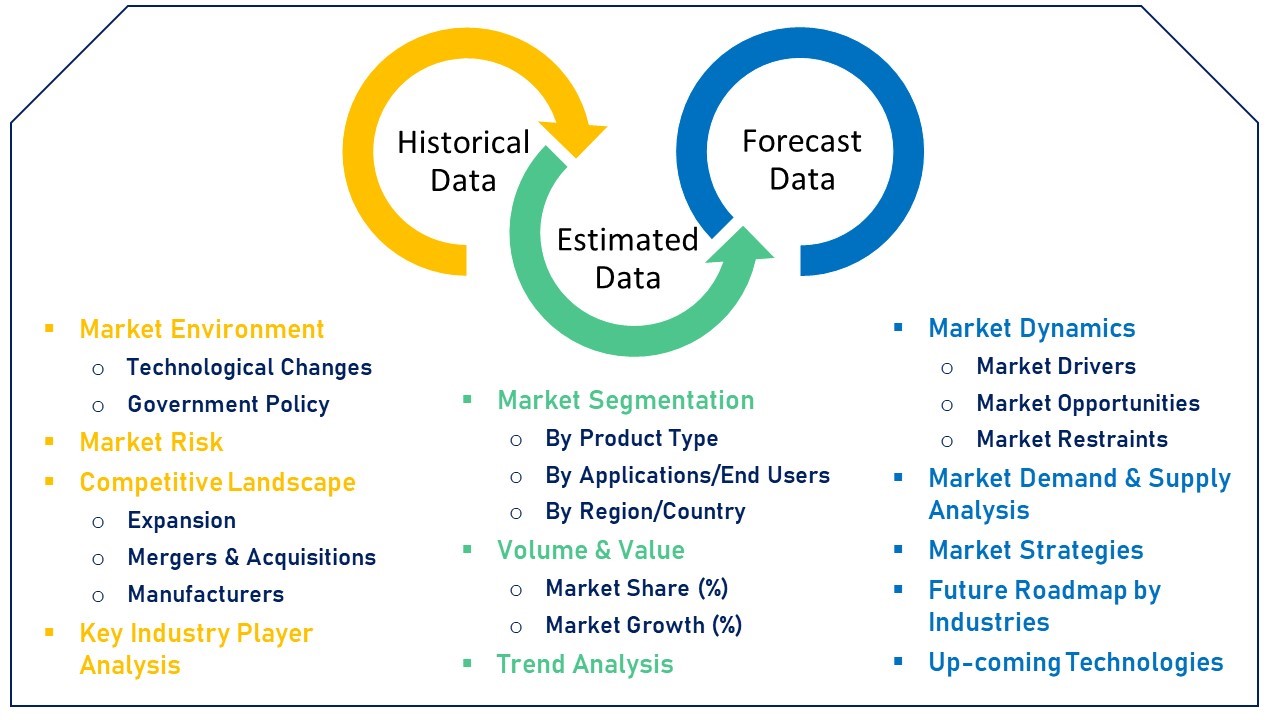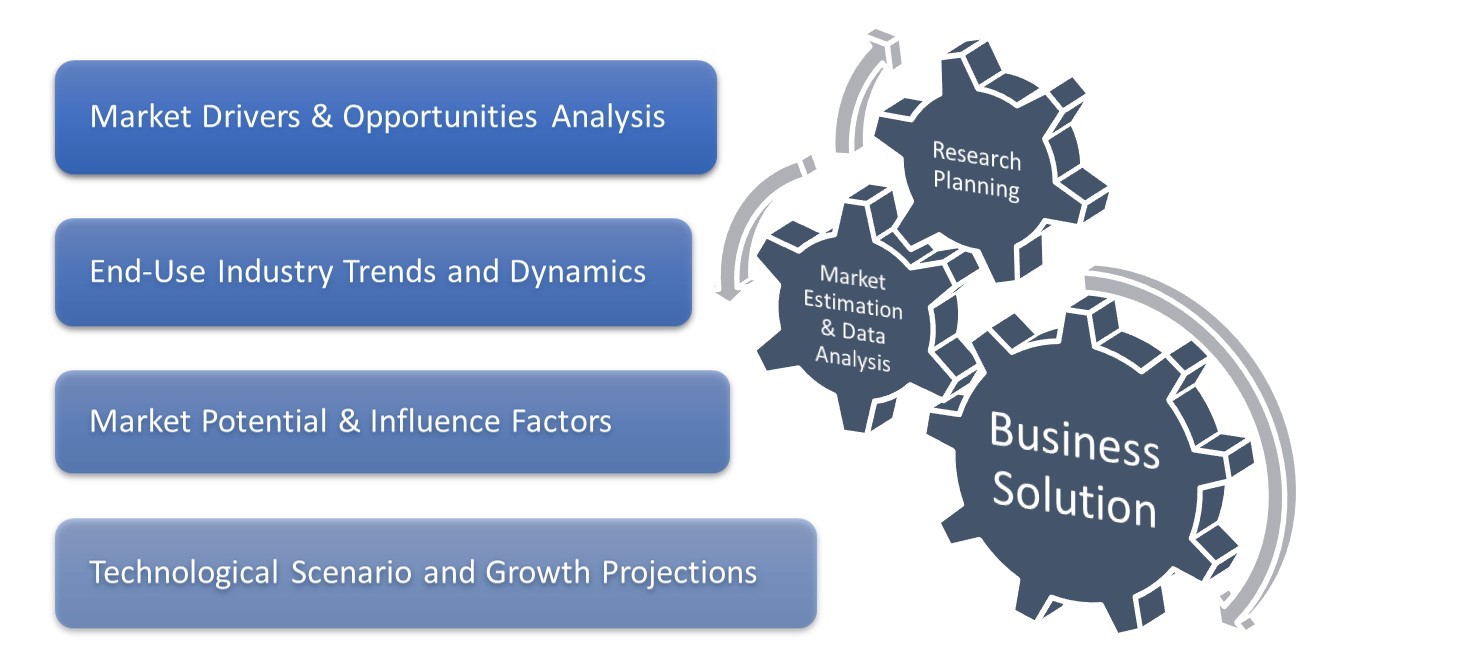Biocompatible Plastics market is segmented by Type, and by Application. Players, stakeholders, and other participants in the global Biocompatible Plastics market will be able to gain the upper hand as they use the report as a powerful resource. The segmental analysis focuses on sales, revenue and forecast by Type and by Application for the period 2015-2026. Segment by Type, the Biocompatible Plastics market is segmented into PEEK PPSU POM PP Others Segment by Application, the Biocompatible Plastics market is segmented into Implant Devices Surface Devices Externally Communicating Devices Regional and Country-level Analysis The Biocompatible Plastics market is analysed and market size information is provided by regions (countries). The key regions covered in the Biocompatible Plastics market report are North America, Europe, Asia Pacific, Latin America, Middle East and Africa. It also covers key regions (countries), viz, U.S., Canada, Germany, France, U.K., Italy, Russia, China, Japan, South Korea, India, Australia, Taiwan, Indonesia, Thailand, Malaysia, Philippines, Vietnam, Mexico, Brazil, Turkey, Saudi Arabia, U.A.E, etc. The report includes country-wise and region-wise market size for the period 2015-2026. It also includes market size and forecast by Type, and by Application segment in terms of sales and revenue for the period 2015-2026. Competitive Landscape and Biocompatible Plastics Market Share Analysis Biocompatible Plastics market competitive landscape provides details and data information by players. The report offers comprehensive analysis and accurate statistics on revenue by the player for the period 2015-2020. It also offers detailed analysis supported by reliable statistics on revenue (global and regional level) by players for the period 2015-2020. Details included are company description, major business, company total revenue and the sales, revenue generated in Biocompatible Plastics business, the date to enter into the Biocompatible Plastics market, Biocompatible Plastics product introduction, recent developments, etc. The major vendors covered: Ensinger Reading Plastic R?chling AZoM Covestro Contour Electronics ...
This research study involves broad usage of both secondary and primary data sources. The research process involves the identification of numerous factors which affect the industry, comprising the market environment, government policy, historical data, present trends in the market, competitive landscape, technological innovation, upcoming technologies and the technical progress in related industry, and market risks, opportunities, market barriers and challenges.

Market Estimation
Top-down and bottom-up approaches are used for validating the market size for companies, regional segments along with relevant market segmentations such as product type and application.
This report includes market estimations which are based on the marketed sale price of a product. Further breakdown of product segments, particular market share are formed based on the weightage assigned to every segment, which is derived of their usage rate and average price. The entire probable factors which effect the markets and influence them in a great way are included in this research report; and have been accounted for, studied in-depth and are confirmed through primary research. These are then studies to get the final qualitative and quantitative data. Any of the factors such as the outcome of inflation, economic downfall, and any kind of policy and regulatory alterations and/or other such factors are not accounted for in the market forecast. All of this data is amalgamated and included with thorough inputs and analysis from Gravitas Market Insights is curated in this report.

Along with the previously mentioned approaches, various data triangulation methods, in order to conduct market estimations and market forecasting for the complete market segments are detailed in this report. Key Companies present in the said market are also acknowledged via in-depth secondary research and primary research.
1 Study Coverage 1.1 Biocompatible Plastics Product Introduction 1.2 Market Segments 1.3 Key Biocompatible Plastics Manufacturers Covered: Ranking by Revenue 1.4 Market by Type 1.4.1 Global Biocompatible Plastics Market Size Growth Rate by Type 1.4.2 PEEK 1.4.3 PPSU 1.4.4 POM 1.4.5 PP 1.4.6 Others 1.5 Market by Application 1.5.1 Global Biocompatible Plastics Market Size Growth Rate by Application 1.5.2 Implant Devices 1.5.3 Surface Devices 1.5.4 Externally Communicating Devices 1.6 Coronavirus Disease 2019 (Covid-19): Biocompatible Plastics Industry Impact 1.6.1 How the Covid-19 is Affecting the Biocompatible Plastics Industry 1.6.1.1 Biocompatible Plastics Business Impact Assessment - Covid-19 1.6.1.2 Supply Chain Challenges 1.6.1.3 COVID-19?s Impact On Crude Oil and Refined Products 1.6.2 Market Trends and Biocompatible Plastics Potential Opportunities in the COVID-19 Landscape 1.6.3 Measures / Proposal against Covid-19 1.6.3.1 Government Measures to Combat Covid-19 Impact 1.6.3.2 Proposal for Biocompatible Plastics Players to Combat Covid-19 Impact 1.7 Study Objectives 1.8 Years Considered 2 Executive Summary 2.1 Global Biocompatible Plastics Market Size Estimates and Forecasts 2.1.1 Global Biocompatible Plastics Revenue 2015-2026 2.1.2 Global Biocompatible Plastics Sales 2015-2026 2.2 Biocompatible Plastics Market Size by Region: 2020 Versus 2026 2.2.1 Global Biocompatible Plastics Retrospective Market Scenario in Sales by Region: 2015-2020 2.2.2 Global Biocompatible Plastics Retrospective Market Scenario in Revenue by Region: 2015-2020 3 Global Biocompatible Plastics Competitor Landscape by Players 3.1 Biocompatible Plastics Sales by Manufacturers 3.1.1 Biocompatible Plastics Sales by Manufacturers (2015-2020) 3.1.2 Biocompatible Plastics Sales Market Share by Manufacturers (2015-2020) 3.2 Biocompatible Plastics Revenue by Manufacturers 3.2.1 Biocompatible Plastics Revenue by Manufacturers (2015-2020) 3.2.2 Biocompatible Plastics Revenue Share by Manufacturers (2015-2020) 3.2.3 Global Biocompatible Plastics Market Concentration Ratio (CR5 and HHI) (2015-2020) 3.2.4 Global Top 10 and Top 5 Companies by Biocompatible Plastics Revenue in 2019 3.2.5 Global Biocompatible Plastics Market Share by Company Type (Tier 1, Tier 2 and Tier 3) 3.3 Biocompatible Plastics Price by Manufacturers 3.4 Biocompatible Plastics Manufacturing Base Distribution, Product Types 3.4.1 Biocompatible Plastics Manufacturers Manufacturing Base Distribution, Headquarters 3.4.2 Manufacturers Biocompatible Plastics Product Type 3.4.3 Date of International Manufacturers Enter into Biocompatible Plastics Market 3.5 Manufacturers Mergers & Acquisitions, Expansion Plans 4 Breakdown Data by Type (2015-2026) 4.1 Global Biocompatible Plastics Market Size by Type (2015-2020) 4.1.1 Global Biocompatible Plastics Sales by Type (2015-2020) 4.1.2 Global Biocompatible Plastics Revenue by Type (2015-2020) 4.1.3 Biocompatible Plastics Average Selling Price (ASP) by Type (2015-2026) 4.2 Global Biocompatible Plastics Market Size Forecast by Type (2021-2026) 4.2.1 Global Biocompatible Plastics Sales Forecast by Type (2021-2026) 4.2.2 Global Biocompatible Plastics Revenue Forecast by Type (2021-2026) 4.2.3 Biocompatible Plastics Average Selling Price (ASP) Forecast by Type (2021-2026) 4.3 Global Biocompatible Plastics Market Share by Price Tier (2015-2020): Low-End, Mid-Range and High-End 5 Breakdown Data by Application (2015-2026) 5.1 Global Biocompatible Plastics Market Size by Application (2015-2020) 5.1.1 Global Biocompatible Plastics Sales by Application (2015-2020) 5.1.2 Global Biocompatible Plastics Revenue by Application (2015-2020) 5.1.3 Biocompatible Plastics Price by Application (2015-2020) 5.2 Biocompatible Plastics Market Size Forecast by Application (2021-2026) 5.2.1 Global Biocompatible Plastics Sales Forecast by Application (2021-2026) 5.2.2 Global Biocompatible Plastics Revenue Forecast by Application (2021-2026) 5.2.3 Global Biocompatible Plastics Price Forecast by Application (2021-2026) 6 North America 6.1 North America Biocompatible Plastics by Country 6.1.1 North America Biocompatible Plastics Sales by Country 6.1.2 North America Biocompatible Plastics Revenue by Country 6.1.3 U.S. 6.1.4 Canada 6.2 North America Biocompatible Plastics Market Facts & Figures by Type 6.3 North America Biocompatible Plastics Market Facts & Figures by Application 7 Europe 7.1 Europe Biocompatible Plastics by Country 7.1.1 Europe Biocompatible Plastics Sales by Country 7.1.2 Europe Biocompatible Plastics Revenue by Country 7.1.3 Germany 7.1.4 France 7.1.5 U.K. 7.1.6 Italy 7.1.7 Russia 7.2 Europe Biocompatible Plastics Market Facts & Figures by Type 7.3 Europe Biocompatible Plastics Market Facts & Figures by Application 8 Asia Pacific 8.1 Asia Pacific Biocompatible Plastics by Region 8.1.1 Asia Pacific Biocompatible Plastics Sales by Region 8.1.2 Asia Pacific Biocompatible Plastics Revenue by Region 8.1.3 China 8.1.4 Japan 8.1.5 South Korea 8.1.6 India 8.1.7 Australia 8.1.8 Taiwan 8.1.9 Indonesia 8.1.10 Thailand 8.1.11 Malaysia 8.1.12 Philippines 8.1.13 Vietnam 8.2 Asia Pacific Biocompatible Plastics Market Facts & Figures by Type 8.3 Asia Pacific Biocompatible Plastics Market Facts & Figures by Application 9 Latin America 9.1 Latin America Biocompatible Plastics by Country 9.1.1 Latin America Biocompatible Plastics Sales by Country 9.1.2 Latin America Biocompatible Plastics Revenue by Country 9.1.3 Mexico 9.1.4 Brazil 9.1.5 Argentina 9.2 Central & South America Biocompatible Plastics Market Facts & Figures by Type 9.3 Central & South America Biocompatible Plastics Market Facts & Figures by Application 10 Middle East and Africa 10.1 Middle East and Africa Biocompatible Plastics by Country 10.1.1 Middle East and Africa Biocompatible Plastics Sales by Country 10.1.2 Middle East and Africa Biocompatible Plastics Revenue by Country 10.1.3 Turkey 10.1.4 Saudi Arabia 10.1.5 U.A.E 10.2 Middle East and Africa Biocompatible Plastics Market Facts & Figures by Type 10.3 Middle East and Africa Biocompatible Plastics Market Facts & Figures by Application 11 Company Profiles 11.1 Ensinger 11.1.1 Ensinger Corporation Information 11.1.2 Ensinger Description, Business Overview and Total Revenue 11.1.3 Ensinger Sales, Revenue and Gross Margin (2015-2020) 11.1.4 Ensinger Biocompatible Plastics Products Offered 11.1.5 Ensinger Recent Development 11.2 Reading Plastic 11.2.1 Reading Plastic Corporation Information 11.2.2 Reading Plastic Description, Business Overview and Total Revenue 11.2.3 Reading Plastic Sales, Revenue and Gross Margin (2015-2020) 11.2.4 Reading Plastic Biocompatible Plastics Products Offered 11.2.5 Reading Plastic Recent Development 11.3 R?chling 11.3.1 R?chling Corporation Information 11.3.2 R?chling Description, Business Overview and Total Revenue 11.3.3 R?chling Sales, Revenue and Gross Margin (2015-2020) 11.3.4 R?chling Biocompatible Plastics Products Offered 11.3.5 R?chling Recent Development 11.4 AZoM 11.4.1 AZoM Corporation Information 11.4.2 AZoM Description, Business Overview and Total Revenue 11.4.3 AZoM Sales, Revenue and Gross Margin (2015-2020) 11.4.4 AZoM Biocompatible Plastics Products Offered 11.4.5 AZoM Recent Development 11.5 Covestro 11.5.1 Covestro Corporation Information 11.5.2 Covestro Description, Business Overview and Total Revenue 11.5.3 Covestro Sales, Revenue and Gross Margin (2015-2020) 11.5.4 Covestro Biocompatible Plastics Products Offered 11.5.5 Covestro Recent Development 11.6 Contour Electronics 11.6.1 Contour Electronics Corporation Information 11.6.2 Contour Electronics Description, Business Overview and Total Revenue 11.6.3 Contour Electronics Sales, Revenue and Gross Margin (2015-2020) 11.6.4 Contour Electronics Biocompatible Plastics Products Offered 11.6.5 Contour Electronics Recent Development 11.1 Ensinger 11.1.1 Ensinger Corporation Information 11.1.2 Ensinger Description, Business Overview and Total Revenue 11.1.3 Ensinger Sales, Revenue and Gross Margin (2015-2020) 11.1.4 Ensinger Biocompatible Plastics Products Offered 11.1.5 Ensinger Recent Development 12 Future Forecast by Regions (Countries) (2021-2026) 12.1 Biocompatible Plastics Market Estimates and Projections by Region 12.1.1 Global Biocompatible Plastics Sales Forecast by Regions 2021-2026 12.1.2 Global Biocompatible Plastics Revenue Forecast by Regions 2021-2026 12.2 North America Biocompatible Plastics Market Size Forecast (2021-2026) 12.2.1 North America: Biocompatible Plastics Sales Forecast (2021-2026) 12.2.2 North America: Biocompatible Plastics Revenue Forecast (2021-2026) 12.2.3 North America: Biocompatible Plastics Market Size Forecast by Country (2021-2026) 12.3 Europe Biocompatible Plastics Market Size Forecast (2021-2026) 12.3.1 Europe: Biocompatible Plastics Sales Forecast (2021-2026) 12.3.2 Europe: Biocompatible Plastics Revenue Forecast (2021-2026) 12.3.3 Europe: Biocompatible Plastics Market Size Forecast by Country (2021-2026) 12.4 Asia Pacific Biocompatible Plastics Market Size Forecast (2021-2026) 12.4.1 Asia Pacific: Biocompatible Plastics Sales Forecast (2021-2026) 12.4.2 Asia Pacific: Biocompatible Plastics Revenue Forecast (2021-2026) 12.4.3 Asia Pacific: Biocompatible Plastics Market Size Forecast by Region (2021-2026) 12.5 Latin America Biocompatible Plastics Market Size Forecast (2021-2026) 12.5.1 Latin America: Biocompatible Plastics Sales Forecast (2021-2026) 12.5.2 Latin America: Biocompatible Plastics Revenue Forecast (2021-2026) 12.5.3 Latin America: Biocompatible Plastics Market Size Forecast by Country (2021-2026) 12.6 Middle East and Africa Biocompatible Plastics Market Size Forecast (2021-2026) 12.6.1 Middle East and Africa: Biocompatible Plastics Sales Forecast (2021-2026) 12.6.2 Middle East and Africa: Biocompatible Plastics Revenue Forecast (2021-2026) 12.6.3 Middle East and Africa: Biocompatible Plastics Market Size Forecast by Country (2021-2026) 13 Market Opportunities, Challenges, Risks and Influences Factors Analysis 13.1 Market Opportunities and Drivers 13.2 Market Challenges 13.3 Market Risks/Restraints 13.4 Porter?s Five Forces Analysis 13.5 Primary Interviews with Key Biocompatible Plastics Players (Opinion Leaders) 14 Value Chain and Sales Channels Analysis 14.1 Value Chain Analysis 14.2 Biocompatible Plastics Customers 14.3 Sales Channels Analysis 14.3.1 Sales Channels 14.3.2 Distributors 15 Research Findings and Conclusion 16 Appendix 16.1 Research Methodology 16.1.1 Methodology/Research Approach 16.1.2 Data Source 16.2 Author Details
